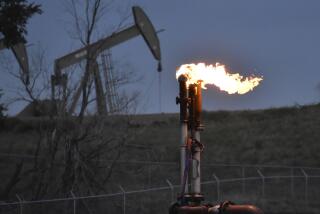Report Faults U.S. Policies for Adding to Environmental Problems
- Share via
Three interconnected and growing environmental and national security threats--global warming, air pollution and dependence on foreign oil imports--are being aggravated by existing federal policies, a report by a Washington-based public policy research group warned Tuesday.
All three problems, the World Resources Institute said, are linked through the gases, pollutants and technologies associated with the burning of fossil fuels for transportation and the generation of electricity. The report called for a comprehensive federal strategy emphasizing a new energy efficiency, air pollution controls in the short term and a transition to new energy alternatives in the longer term, including solar and nuclear power
“The closer we look, the clearer it becomes that we will not be able to solve any of (the three problems) piecemeal, at least not without aggravating one or both of the others,” the report said.
It said that burning fossil fuels--coal, oil, gasoline and natural gas--releases carbon dioxide, the principal gas linked to global warming. Burning fossil fuels also results in urban air pollution and acid rain.
Finally, it said the United States is importing a growing percentage of its oil supplies, “a pattern that poses long-term financial and national security risks.” Foreign oil was expected to account for 37% of U.S. supplies by the end of this year, with more than half of imports coming from OPEC producers.
James MacKenzie, who authored the report, said in a telephone interview from Washington: “The problems are linked, and many of the policies we’re considering are just not helpful at all.”
He noted that while the U.S. Department of Energy has called for less reliance on foreign oil, the U.S. Department of Transportation this year relaxed fuel economy standards for new automobiles. Congress has also authorized increasing the maximum speed limit on certain interstate highways.
In the United States, motor vehicles account for 31% of all carbon dioxide emissions, 70% of carbon monoxide emissions and 41% of nitrogen oxide and organic compound releases, all of which contribute to urban air pollution. Additionally, carbon monoxide interferes with natural processes that destroy atmospheric methane, another gas that scientists say may contribute to global warming, the report said.
MacKenzie said he is also concerned about the possibility of switching to methanol-powered vehicles, as has been advocated by the South Coast Air Quality Management District. Such a shift, while meant to improve urban air quality and reduce oil imports, could compound global warming if the methanol is made from coal.
“It doesn’t make sense to start down that road. It’s a dead-end,” MacKenzie said. He said that a car burning methanol made from coal would produce twice the carbon dioxide emissions per mile as one burning gasoline.
Argument for Methanol
The AQMD, however, has said there are ample supplies of natural gas from Mexico and Canada to make methanol. Methanol made from natural gas would reduce carbon dioxide emissions 7% to 9% below emissions from gasoline, Paul Wuebben, manager of the AQMD’s clean fuels program, said.
The institute’s report concluded that to effectively deal with the three interconnected problems would require “a willingness to adjust the way we live.
More to Read
Sign up for Essential California
The most important California stories and recommendations in your inbox every morning.
You may occasionally receive promotional content from the Los Angeles Times.










